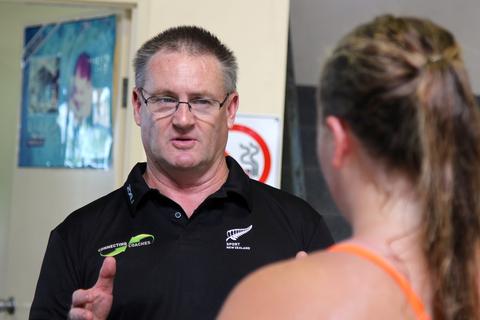Sports Psycho-physiology: The Way Forward in Successful Coaching and Sports Performance.

Want to know about the latest breakthrough in thinking in sport?
Want to learn about how to coach more effectively and get more out of every training session?
Want to hear how to enhance the performance of your athletes?
Here it is: the latest thing – Psycho-physiology (more specifically sports psycho-physiology): The way forward in successful coaching and sports performance.
And guess what?
This revolutionary breakthrough in sports performance is so new that it has only been around for 5000 years…..
What is Sports Psycho-Physiology?
Sports Psycho-physiology (and let me be the first to introduce the inevitable acronym SPP) is a fancy name for the integration of mind and body in the effective training, preparation and performance strategies of athletes. It is about helping athletes to perform better through using their mind and body in harmony in training and competition.
Everything old is new again: Psycho-physiology through the ages.
Before someone steps up and writes a book claiming to be the guru of sports psycho-physiology and that they invented it, this stuff has been around for a long, long time. The Ancient Greeks, the Romans, the Chinese and many other great civilizations all have written about, spoken about and lived the integrated mind-body philosophy.
So it has been around for a long time, but only now are coaches and athletes starting to think about how to apply psycho-physiology to enhancing the effectiveness of training and preparation for sports competition.
The only three really new things about (sports) psycho-physiology are:
- Sports scientists and coaches are finally waking up to the understanding that you can’t train the body without simultaneously training the mind IF you want to achieve optimal results;
- We now have the techniques and the technologies where we can measure the changes in the brain that occur through the introduction of mind-body integration techniques, e.g. CBT, mindfulness, meditation;
- We have finally got to the point where we can integrate (sports) psycho-physiology in the Daily Athlete Training Environment (D.A.T.E.) through smart coaching.
What is being done in (Sports) Psycho-Physiology?
There is a lot of exciting work being done around the world in this “new” breakthrough area: here are just three examples:
- In the field of cardio-vascular disease, researchers are looking more and more at the physiological impact of mental and emotional stresses and mental illness, e.g. anxiety, bi-polar disorder and depression. As a result, we now better understand how mental and emotional states can effect the body (e.g. changes in heart rate, blood pressure, adrenalin levels and platelet formation) all of which has enormous implications for competitive sport;
- Researchers are looking closely at the impact of introducing mental skills training techniques like “mindfulness”into training programs including measuring pre (mindfulness) / post (mindfulness) performance of athletes with fMRI technology;
- Many professional teams are using psycho-physiology by measuring brain wave activity as one indicator of over-training, over-reaching and fatigue.
It all adds to up to one thing…………Sports Psycho-Physiology is here and it promises to be bigger (and better) than Pilates, Swiss Balls and Creatine Supplements – the difference being….psycho-physiology actually works!!!
So What does this mean to Athletes.
For athletes, SPP offers unlimited potential for enhanced performance. Traditionally we have prepared athletes for the most part from a physiological standpoint: speed, strength, endurance, power, agility, flexibility…..and then sent them out to “battle” in great physical shape. The “mental” side of preparation we have left to a few war crys, the pre-match psyche up and the ubiquitous (but generally useless) motivation speech. We have laboured under the misguided view that getting the body ready is enough.
However, this is the equivalent of strapping a Ferrari engine to a bicycle frame! An athlete who is well prepared physically but who does not possess an understanding of how to integrate their mind and their “Ferrari engine” together in training and competition can not realise their full potential.
So for athletes…..you have the best ever opportunity to see your dreams become reality.
What does it mean for Coaches.
The key for coaches is to integrate SPP into their training and preparation environments by the addition of a mental component in their planning, periodisation and exercise prescription.
So, in practical terms, it means adding a mental element to every training set, every skill practice routine, every fitness activity: to change your programming tools from just volume, intensity and frequency to volume, intensity, frequency AND a mental factor.
Once you make this fundamental philosophical step of incorporating a mental aspect into your physical training routines and practices your coaching will achieve new heights.
(Watch for a future post: Programming with Sports Psycho-physiology).
What does it mean for Sporting Institutions, Universities, Academies, Coach Educators etc.
For sporting institutions, the Sports Psycho-physiology revolution means four things:
- Integration– of physiology and psychology resources, staff, research and departments;
- Innovation – solving performance problems which incorporate mind / body solutions;
- Inspiration – seeing this new direction as a limitless opportunity to find performance breakthroughs through integrated research, different thinking and as an incredible opportunity to help athletes and coaches achieve new levels of excellence;
- Illumination – changing the way we educate coaches about sports science right from their first day in the coach education system.
The Silo System is Dead.
Now that the “silo” (i.e. single discipline, reductionist) approach to applying sports science to athlete and coach performance is finally being seriously challenged around the world, more and more of these “inter-disciplinary” breakthroughs will emerge….
So what’s the next inter-disciplinary breakthrough likely to be?
Bio-physiology:(i.e. bio-mechanics and physiology): Imagine what we could achieve by integrating the fields of bio-mechanics and physiology so that when we make a change to an athlete’s technique or skills, we simultaneously consider the impact on physiological efficiency, energy cost, oxygen dynamics etc.
Psycho-mechanics: (i.e. psychology and bio-mechanics): Imagine what we could achieve if we incorporated a mental component into bio-mechanics so that when we work on improving, changing and enhancing an athlete’s technique, we also include things like relaxation, flow, feeling, focus, concentration and mindfulness.
Now that the shackles of the single discipline silo approach to sports science have been removed, so too have the limits to human performance.
Question….Where will it end?
Answer….It wont!
Wayne Goldsmith



6 Comments
Paul Clarke · February 21, 2011 at 6:49 pm
Great article Wayne.It’s an element of coaching I’ve been trying to improve on for the past few years. There’s a little more to consistent top quality performance than strength, speed, skill etc. Have you any suggestions on sites or books for further reading? Also, in your experience which coaches have you come across that are really good proponents of this approach?
thanks, Paul.
Wayne Goldsmith · February 21, 2011 at 7:06 pm
Thanks Paul.
I think when you have been involved in sport for a while you realise that the main reason physiology dominates most coaching programs is that it is easy to “see”, measure and manipulate.
When someone comes up with a reliable and valid test for “values” or “focus” or “concentration” or “relaxation” which can be used as simply and easily as a heart rate monitor or GPS unit, they will make millions.
Most of this “mind-body” stuff has been relegated to the “questionable” science and “hippie-stuff”.
I suspect that the next step must be finding a way to integrate mental development with physical development at a planning and programming level, i.e. integrating mind and body in training sets and practice routines.
In terms of reading – there is not much around on this specific topic.
If I could get off my backside I would write a book about it as it has huge implications for sport everywhere.
WG
Jody Martins · February 23, 2011 at 4:38 am
Hi Wayne,
Will be honest I thoroughly enjoyed this post by you, have long been under the impression that the mental side is neglected. I agree that we tend to focus on the physical. In cricket coaching in South Africa there is at times a big focus on the physical side and on the technical side. But I have realised that technique and the physical are very dependant on mental frame of mind. If a player looses ‘form’ (not that I like the word) most of the time in my mind it is not technical, or physical but a combination of all factors, but the mental gets overlooked.
Have a great day!
Jody
Wayne Goldsmith · February 23, 2011 at 7:35 am
Thanks Jody.
Form is a combination of confidence, fitness, “match-readiness” and many other factors.
More than one coach has made the mistake, when faced with “poor-form” or inconsistent form, of just adding more training sessions.
An old friend of mine says “It’s no good coming up with the a great solution to the wrong problem”.
Adding training sessions is only a great solution if the problem is related to physical preparation.
If the problem is technical, tactical, cultural, mental or emotional in nature then the solution needs to be based on technical, tactical, cultural, mental and emotional factors.
But the easiest thing to do is just add more training sessions so that’s the framework for how most people try to solve performance problems.
Thanks again,
WG
valentin Uzunov · March 2, 2011 at 12:50 am
Hi Wayne
Great article again. I love this blog, by far the best there is that i have seen on sports coaching.
The topic is like you said not new, but has most definitely been one that is ignored, not only in sports, but also in medicine. However this is also changing as new methods of testing this connection are being developed. At least in medicine the placebo effect is one such area that is now being studied again.
The problem will however always fall down to implementation into trainings, especially at the club level. The current approach is that a well physically prepared athlete is a confident athlete. And even though this does hold true on the outside, usually those athletes that are ‘that’ well prepared have and use mental skills that others do not posses, use, or have developed.
The psychological factor in sport is only in the last decade or so taken a solid hold into the training of athletes, despite having been around for a long time. Psycho-physical training i don’t think will make a huge impact soon, but it will eventually that is for sure.
Thanks,
Valentin Uzunov
TheGymPress
http://www.thegympress.net
Wayne Goldsmith · March 2, 2011 at 9:28 am
Thanks Valentin.
Totally agree with you. The easy way to build confidence is to train until you can’t train any more, then falling back on the old “if we are better physically prepared then we must be better mentally ready to compete”.
This has worked well in the past and many Olympic champions have got the gold medal completely due to their physical preparation.
However, I have also seen thousands fail in competition due to this “physical preparation = mental preparation” approach and we all have to do better.
Until we start educating coaches on how to apply psycho-physiology in their day to day training, things will not change…but like you I am hopeful things will change in the future.
Thanks again,
WG